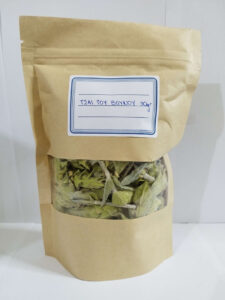Mountain tea is a particularly popular herb, beloved in all Mediterranean countries, especially during the winter months. Its nutritional value is remarkable and along with its unique aftertaste, it also contributes to the hydration of the body. Its scientific name is Sideritis and more than 100 different species have been recorded, of which 17 grow exclusively in Greece: Sideritis perforated on Mount Athos (Sideritis perfoliata), Sideritis clandestina on Taygetos (Sideritis clandestina), Sideritis syriaca on Crete (Sideritis syriaca), Sideritis scardica on Mount Olympus (Sideritis scardica), Sideritis euboea on Euboea (Sideritis euboea), etc. All species are resistant to heat and drought and grow among rocks.
Greece and Spain are the countries with the highest consumption of mountain tea. All Greek species are threatened with extinction due to uncontrolled collection and only recently has its cultivation started in Greece. In recent years it has been the subject of intense study by scientists, thanks to its various soothing properties. Traditionally, it is preferred for its beneficial effect on colds, respiratory problems, indigestion and other gastrointestinal disorders.

What are its properties?
The scientific studies on it are numerous and their number is constantly increasing in order to examine the effect of its components on the human body. Mountain tea contains a valuable arsenal of flavonoids, catechins, monoterpenes, diterpenes, triterpenic acids, phenylpropenes, sterols, iridoids, essential oils, curcumin and caryophyllin. Many modern researches are coming to document the actions of these substances, which seem to be valuable for the human body. More specifically:
Osteoporosis
According to a study by the University of Athens, extracts of the species Sideritis euboea and Sideritis clandestina may contribute to the prevention of osteoporosis, as they were shown to protect against loss of bone density and enhance the mechanical strength of bones.
Alzheimer’s disease
According to a study by the Research Centre for Neurological Diseases at the University of Magdeburg, it was found that Greek mountain tea has unique beneficial properties that act against the disease. It was shown that mountain tea, and specifically the Olympus species Sideritis scardica, affects the inhibition of the reuptake of brain substances that process the transfer of messages from one brain cell to another (substances called neurotransmitters). In particular, it has been found that its daily regular consumption for 6 months helps to reduce symptoms to the level of the disease 9 months before, and then stabilises the patient’s condition. Following the results of this study, the aim of this research group is to prepare a pharmaceutical preparation from Greek mountain tea, specifically from the species Sideritis scardica of Mount Olympus.
Hypertension
Animal studies show that systematic daily intake of the recommended daily dose of Sideritis extract leads to dilation-relaxation of blood vessels, resulting in lowering blood pressure levels and reducing stress on the heart muscle. There is considerable evidence that mountain tea may help to enhance cardiovascular health, but further research is needed before it can be considered an effective treatment for humans.
Digestive System
Mountain tea is traditionally used in our country to enhance digestive health and relieve indigestion and stomach pain. Research shows that it helps reduce inflammation of the gastrointestinal tract due to its phenolic and antioxidant content.
Antioxidant, anti-inflammatory, anxiolytic action
A research team of the Universities of Patras and Ioannina examined the decoction of Sideritis clandestina and found its anti-inflammatory, antioxidant and anxiolytic effects. Its anti-inflammatory and antioxidant properties are due to glycosides of apigenin. In experiments on mice, it was found that the antioxidant defences of brain areas of those who consumed a mountain tea decoction for 6 weeks were enhanced. In addition, it was shown to combat anxiety, i.e. it has anxiolytic action, without the side effects observed in other herbal anxiolytics.
Antimicrobial
Analyses by Greek researchers, carried out on sideritis plants, have shown that they contain many essential oils with antimicrobial effect (mainly against Gram+ microbes but also against a specific line of the fungus Candida Albicans), while Euboea tea showed activity against specific microbes, similar to the antibiotics ampicillin and amikacin. In addition, the essential oils of mountain tea, and in particular those of malota (Sideritis syriaca), are particularly active antimicrobials due to their carbacrol content.
Other actions
Anti-anemic (contains iron), anti-aging (due to its antioxidant components is an ingredient of care products such as anti-aging creams, hair masks, etc.), antispasmodic, diuretic, helps good kidney function and acts preventively against the appearance of cataracts. In addition, mountain tea strengthens the immune system and in particular seems to be effective in the treatment of colds, nasal congestion, respiratory problems and persistent cough.
A little historical information
Mountain tea, or siderite, has been known since the time of Dioscorides and Hippocrates, who recommended it as a tonic herb and favoured it for its healing properties, ideal for treating wounds from iron objects in battle (swords, arrows), to which it owes its name. For other contemporaries of Hippocrates, the name denoted the shoots of the plant, which had swords that resembled the point of a spear. Today, swords and arrows are a thing of the past, but mountain tea, rich in iron and copper, remains the most popular and perhaps our most beloved Greek herb, and one that almost no home is without. The classic common tea or black tea has nothing to do with mountain tea. Black tea comes from the leaves of the Camelia sinensis plant, contains caffeine and different polyphenols, while the biological properties attributed to it differ significantly.






Reviews
There are no reviews yet.